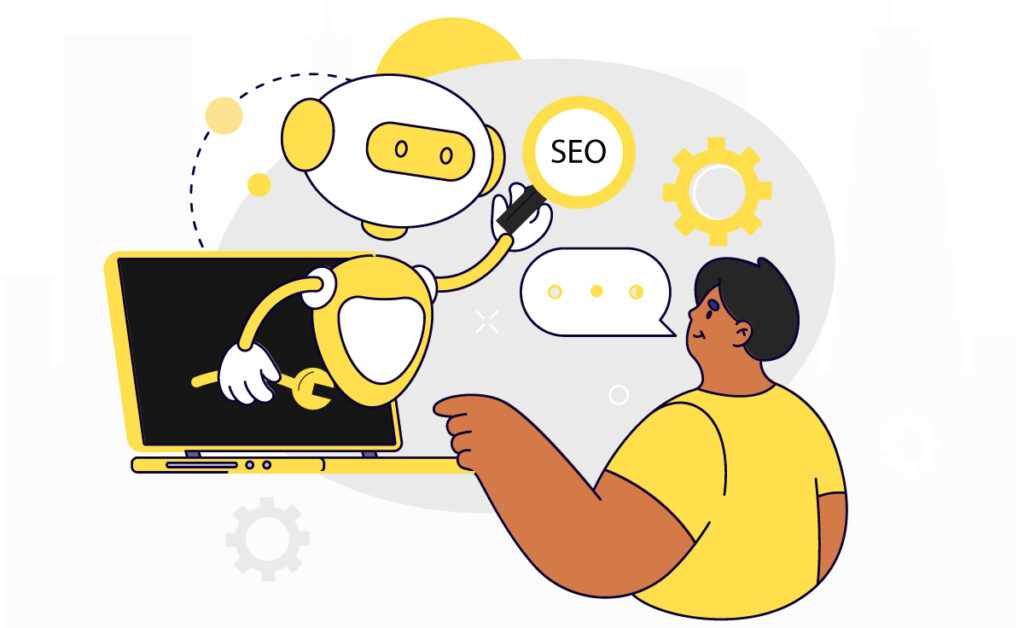Everyone has an opinion, but no one has a straight answer to this question. A “yes” comes with a long list of risks that can get you in trouble with Google. A “no” comes with another long list of generic buzzwords that try to convince you otherwise.
We’ll say what no one else is saying, the TRUTH.
Don’t use AI to write content for your website. It’s inaccurate, it invents details when it doesn’t have them, and it sounds like every other bland and generic content out there.
One slip, and your credibility tanks. Readers stop trusting you, and Google notices. Your SEO drops, your rankings fall, and all the traffic you worked for disappears. Beyond that, AI cannot do what humans do best: creativity, storytelling and nuance. It cannot craft content that connects with your audience, builds your brand or actually sticks. That takes skill, experience, and insight; things you only get from real experience and real human writers.
The Promise of AI Content
If you have not really used it to generate content, let me show you what it looks like.
The first time you use AI for generating content, you might expect it to work flawlessly. After all, all you have to do is type in a prompt, and out comes a “perfect” article. But soon, you’ll realise it’s more like training a new intern who is fast and eager but inexperienced. You give it a task, and it delivers something…but not quite right. The phrasing feels off, facts might be incorrect, and sometimes it misses the point entirely. You find yourself spending more time fixing errors than you expected.

That said, AI isn’t completely useless. What you really need to understand is that AI isn’t a replacement for a writer; it’s a tool that needs clear instructions and careful oversight. When used well, AI can speed up your work, brainstorm with you, and help structure content. But without human guidance, it stumbles.
The quality of the content still depends on YOU. Your expertise, your effort and your final touch.
The Reality Check: Where AI Falls Short
We create content for two reasons: to rank on search engines and to connect with our audience. Basically, we want content that is useful for readers and impressive to Google. Sounds simple enough. But AI has a funny way of making this harder than it should be. To understand how AI falls short in both these areas, you first need to know what Google and readers want.
What Google wants:
Google looks at basically everything when deciding how to rank your content. It uses over 200 signals to evaluate your website. These signals answer: Is your content relevant? Are people actually sticking around to read it, or bouncing after five seconds? Are they clicking through to other pages? Is your site fast, mobile-friendly and properly structured with all the right markup? Do you have credible backlinks pointing to your site? And that’s not even close to all of it…there are easily a hundred more little things, plus freshness and topical relevance thrown in for good measure.
At the heart of all this chaos is E-E-A-T. This acronym stands for Experience, Expertise, Authoritativeness, and Trustworthiness. Google really zeroes in on these factors when evaluating the quality of your content. If your content demonstrates real-world experience, expertise in the subject matter, and trustworthiness, it’s more likely to show up in search results, be considered credible, and be useful to users. Miss these marks, and your effort goes to waste.
In short, Google wants everything perfect, all at once, and it’s not shy about penalising you if you don’t deliver on these fronts.
How AI fails at impressing Google:
When it comes to really impressing Google, ironically, AI falls short in a very human way. AI cannot provide real-world experience; it lacks nuance, expertise and genuine authority. And when it doesn’t actually know anything about a subject, it sometimes just makes stuff up. Its outputs are often repetitive, formulaic, and generic. Storytelling? Tone? Contextual understanding? Forget it. AI can’t really grasp search intent, which makes creating content that truly satisfies Google…IMPOSSIBLE.
For YMYL (Your Money or Your Life) content, these shortcomings are even more critical, as errors in this category of content can directly affect users’ health, finances, or safety, and Google applies extra scrutiny to such pages.
What your readers want
Your audience doesn’t care about the 200+ ranking signals Google is obsessing over. They care about only one thing: are you answering the question they came with? That’s it. If you do and if you do it correctly, they’ll love your content and trust your business. If you don’t…they’ll leave and probably never come back.
How does AI mess up satisfying your readers?
The simple answer is that it does not understand context. The basics of any communication are understanding context and feelings. Even between humans, a single phrase can mean completely different things to different people. Say you tell a colleague, “That’s interesting.” To one, it is a curious remark. To another, it’s sarcasm. And you will be able to tell the difference between the two immediately. That’s because humans constantly read tone, body language, and assess prior interactions to interpret meaning correctly. We do this without thinking; it’s our second nature.
Now imagine trying to scale that subtle understanding across thousands of readers with a tool that doesn’t actually think. That’s AI. Sure, you can feed it a user persona, a tone guide, background information, or even your brand’s preferred vocabulary. You can tell it, “Make it warm, approachable, and reassuring.” And yes, it can technically follow those instructions. We tried it too. Here’s one example of what it did when we asked it to follow these instructions:
“The brief: The content is meant for entrepreneurs and small business owners in Tier 2 and Tier 3 cities. This is for sellers who may be new to e-commerce but are interested in expanding their business online. They may be hesitant due to a lack of technical expertise, resources, or prior exposure to digital selling.”
AI-written content:

Human written:

At first glance, both seem well-structured and informative. However, a deeper look reveals the difference: context and connection.
- AI-generated content:
- Sounds polished but lacks warmth and direct connection.Uses formal phrases like “navigating the intricacies” that may not resonate with small-town sellers.
- Presents facts without understanding why they matter to the target audience.
- Human-written content:
- Uses approachable, conversational language.Understands that sellers from Tier 2 and Tier 3 cities need reassurance and clear guidance.
- Speaks to the reader, making it feel engaging and relevant.
This happened because AI couldn’t truly feel the subtle fears, hopes, and hesitation of a small business owner in a Tier 2 city who’s logging online for the first time, worried that one wrong click could ruin their day. It can mimic empathy. It can sprinkle in friendly phrases. But it can’t actually understand, relate to, or adapt to the human emotions driving that query.
What Google Really Says About AI Content?
What’s really interesting is that Google itself isn’t against AI-generated content! It focuses only on the quality of your content.
In a 2023 post, Google clarified: “Rewarding high-quality content, however it is produced… our systems aim to reward original, high‑quality content that demonstrates expertise, experience, authoritativeness, and trustworthiness.”
Still, that doesn’t mean any AI is acceptable. Google’s updated Quality Rater Guidelines (January 2025) include this warning:
“Generative AI can be a helpful tool for content creation, but like any tool, it can also be misused.”
And if “all or nearly all of the main content is … AI-generated with little or no added value,” it warrants the lowest quality rating.
The proof is in the numbers:
– AI Overviews now appear in 13% of desktop searches, up from about 6.5% in January.
– They occupy nearly half of mobile screen space, and often come with fewer clicks.
– Google admits such summaries can be wrong; some have “hallucinated” errors, and pages using them saw 40 – 60% fewer clicks to original sources.
Basically, Google’s message is crystal clear: Low-quality content gets flagged, whether it’s AI or human. High-quality content gets rewarded, no matter how it’s created.
When AI Content Might Work for You?
After a lot of research, trial and error, and experiments, we have identified the areas where AI can and should be used. The interesting part is that you might expect it only to improve your speed and your team’s productivity, but when used in the right way, AI can actually help improve your content’s quality too. Use AI to:
- Research: AI can break down complex topics and give quick explanations. Think of it as a fast research assistant that gets you started before your team dives in.
Risk: Some information might be outdated or slightly inaccurate, so a human still needs to verify. The benefit is that your team spends less time searching and more time understanding and producing thoughtful content. - Polishing: Tools like Grammarly or other AI editors can improve grammar, readability, and sentence flow before human review.
Risk: AI doesn’t fully understand context and may suggest changes that don’t fit your voice. With a quick human check, your drafts can reach a professional standard faster. - Gap Analysis: This is something that AI absolutely excels at. Just give it a starting point, and AI will highlight content your competitors cover that you haven’t, like FAQs, statistics, or subtopics, giving you a checklist to improve your own content.
Risk: AI’s suggestions depend heavily on the clarity of your target audience. If you don’t define it well, it might churn out content that could confuse your readers. - SEO suggestions and content structuring: AI can analyse keyword opportunities, suggest headings, outline your blogs, and highlight internal linking opportunities.
Risk: SEO suggestions need extreme oversight. AI might push unnatural keyword stuffing or misinterpret search intent, which can hurt rankings if implemented mindlessly. - Roleplay / Idea Generation: AI can simulate different perspectives, such as a marketer or SEO specialist, to suggest tone, phrasing, or content angles.
Risk: If your audience is an expert in the domain, relying too heavily on AI for tone may make your content sound superficial or uninformed. You have to apply your own knowledge to keep it credible.
What do We Do at Justwords?
When content plays a central role in building trust or driving business, cutting corners rarely works. Relying on AI to write thought leadership, lead-gen pages, or YMYL content can create more harm than help, especially when depth, accuracy, and originality matter.
That’s why at Justwords, we don’t use AI for content writing. Every piece of content we deliver is written by a real person who understands your business, your market, and what your audience is looking for. AI plays a limited role in our process, mainly during research and polishing. It helps our team gather background information or explore angles more efficiently, but the content itself is fully developed and written by experienced writers.
We also don’t publish content in bulk using automated tools. Each project is tailored, written from scratch, and built to serve a clear business goal.
So… Should You Use AI Content?
If you’re still unsure, ask yourself: Would I be comfortable putting this content in front of a potential customer or client without edits? Think about it for a second. Would you actually read it aloud in a meeting or share it in a client email exactly as it came out of AI, without tweaking a single word?
If the answer is no, if there’s even the slightest hesitation, then it needs a human touch. Because your audience can sense it too, they can feel when content is impersonal, generic, or tone-deaf. Even a recent study found that AI-generated text has recognisable stylistic patterns that make it easy to detect.
So, your audience will recognise when your content fails to sound like you, address their concerns, or connect on a human level, even if it is grammatically perfect, keyword-optimised, and factually correct. And when that happens, it does more harm than good.
AI can structure and polish. But it can’t decide whether the phrasing lands, whether the tone builds trust, or whether a customer actually nods and says, “Yes, these people get me.” That final judgment belongs only to humans.
In short: if you wouldn’t stand by it in front of a real person, don’t publish it.
Conclusion
AI content has its place. It can save time and speed up simpler tasks. But it isn’t a full solution, especially if you care about quality and performance.
At Justwords, we’ve spent 15 years creating content that performs. We’ve seen every trend come and go. From the days when keyword stuffing was called a “strategy,” to when every brand suddenly needed a blog, to the short-lived craze of pumping out clickbait for quick hits, we’ve seen it all. And we know how quickly these fads dominate the conversation before fading away. But every once in a while, something gets too big to ignore. Right now, that’s AI. You can’t escape it in meetings, inboxes, or industry chatter. Everyone has a hot take on using and trusting AI to create your website content.
If you’re still on the fence, connect with our team. We’ll help you cut through the noise, figure out what really works for your brand, and build a content strategy that delivers results.
Fill the form to reach us or give us a call at 9910203445.





